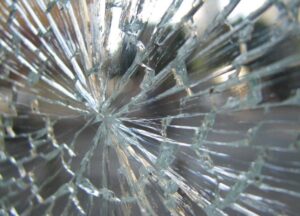Can Bulletproof Glass Stop a Bullet?
There are many applications in which bulletproof glass is highly beneficial. From transporting high-profile guests in cars, protecting government buildings, and even safeguarding pupils in schools. Offering enhanced levels of protection, ballistic glass stops many types of bullets from reaching those people inside.
Bulletproof glass looks exactly like standard glass, however, there are more differences than meets the eye. Depending on the thickness of the glass, bulletproof glass is designed to withstand one or multiple rounds of bullets. In this article, we explore the science behind bullet resistant glass and how it works differently from ordinary glass.
What is Bulletproof Glass Made From?
Bulletproof security glass is often not actually made from glass. In fact, it is a combination of transparent plastics layered with or without glass. The layers of glass and plastic are sandwiched together, separated by thin films.
Why Bulletproof Glass Doesn’t Shatter

Since standard glass does not move, it cannot bend or slowly absorb the energy of the bullet. This means the bullet shatters the glass, moving through without losing any momentum.
The plastic layers inside bulletproof glass are placed in a layout known as laminate. These layers can be up to ten times thicker than standard glass and extremely heavy. When bullets make an impact with bulletproof glass, energy travels sideways through the layers meaning the energy is absorbed very quickly.
How Thick Should Bulletproof Glass Be?
The higher the ballistic power of the weapon and projectile, the thicker the bulletproof glass needs to be. This means that users must anticipate what type of gun would be most likely to be used and then select the right type of barrier to withstand it.
Bulletproof glass ranges from 0.25 inches to 3.5 inches and as the thickness increases, so does the weight. This is critically important to consider when designing and building structures.
Different Levels of Protection
Bulletproof glass ranges in levels of protection from UL 1 to 10.
- For convenience stores and retail settings, small handguns are likely to be the weapon of choice. In these situations level 1 protection is optimum.
- Level 2 protection safeguards against a .357 magnum handgun and works well for banks and financial institutions.
- Level 3 offers protection against .44 magnum handguns and is suitable for high-occupancy buildings such as government facilities, schools, and police stations.
- Level 4-8 offers varying levels of protection against high-powered ammunition, generally used for high-level government buildings, military applications, and embassies.
Bulletproof Glass from Armortex
Armortex has been manufacturing bulletproof glass for many years and has a wealth of experience working with planners, architects, and contractors to design many types of setting requiring bullet resistance.
If you would like to find out more about our bulletproof glass, get in touch with the team for information.
